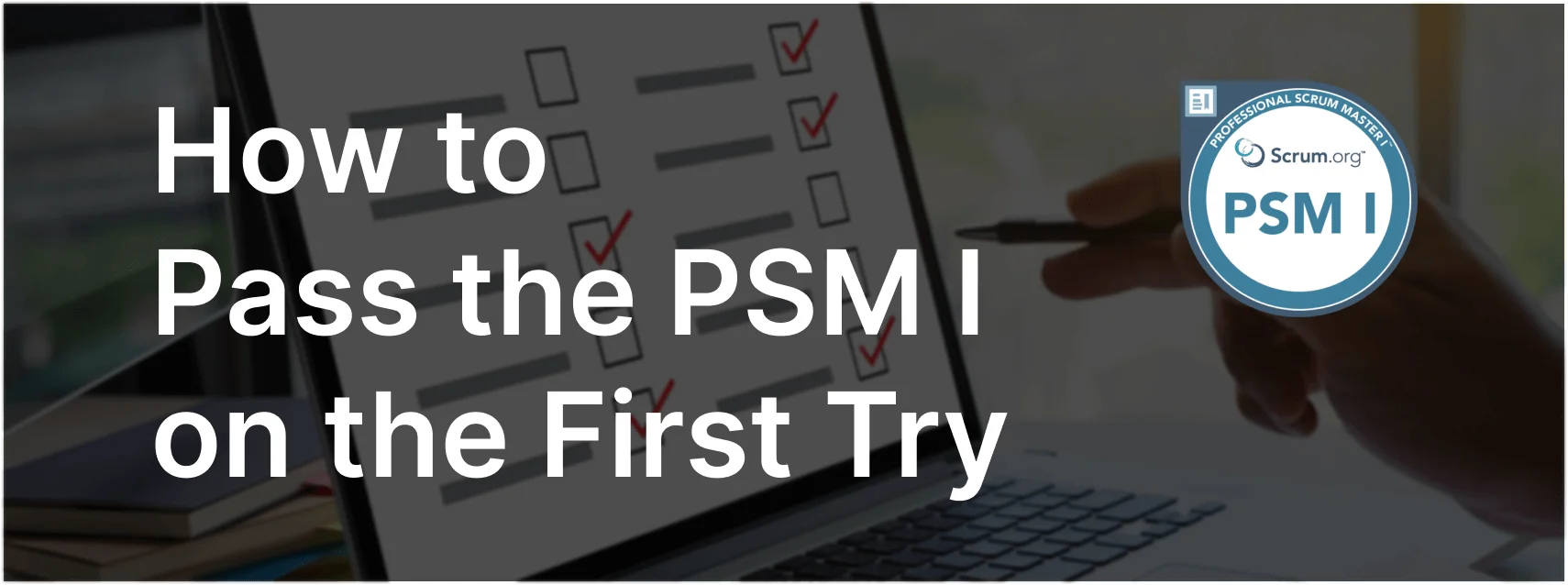
SAFe SPC Exam Guide
The journey to becoming a SAFe Practice Consultant (SPC) is an exciting one, filled with opportunities to deepen your Agile knowledge and contribute significantly to

The Professional Scrum Master I (PSM I) certification is one of the most popular certifications for professionals who want to demonstrate their understanding of the Scrum framework and their ability to apply Scrum in real-world situations. The certification is offered by Scrum.org, a leading global provider of Scrum training and certification.
Passing the PSM I exam on the first attempt is a common goal for many individuals who are preparing for the exam. Achieving this goal requires a solid understanding of the Scrum framework, effective study and preparation strategies, and the ability to perform well during the exam.
Having helped dozens of people get certified,, I’ll provide you with tips and strategies to help you pass the PSM I exam on your first attempt. I’ll discuss the exam format, the content of the exam, effective study and preparation strategies, and exam day strategies. By the end of this article, you will have a better understanding of what it takes to pass the PSM I exam and feel more confident in your ability to do so. Let’s dive in!
Before diving into your exam preparation, it’s important to understand the format of the PSM I exam and the content that will be covered. This knowledge will help you to prepare more effectively and feel more confident on exam day.
The PSM I exam is a multiple-choice exam consisting of 80 questions randomly selected from a 300+ question bank. You will have 60 minutes to complete the exam, and the passing score is 85%. This means you must answer at least 68 questions correctly to pass the exam.
The topics covered in the exam include the Scrum framework, accountabilities, events, and artifacts, as well as the values and principles of Scrum. The exam is designed to test your understanding of how to apply Scrum in real-world situations.
To prepare for the exam, it’s important to have a solid understanding of the Scrum framework and its components, as well as the values and principles that underpin it. You should also be familiar with common Scrum terminology. Although not necessary, it is helpful to have experience working on Scrum Teams.
By understanding the format and content of the exam, you can tailor your study and preparation strategies to focus on the areas where you need the most improvement. This will help you to feel more confident and better prepared when it comes on exam day.
The Scrum framework is the foundation of the PSM I exam, and a solid understanding of the framework is critical to passing the exam on the first attempt. The framework is designed to help teams work together to achieve their goals, and it is based on a set of values and principles that guide the way teams work.
The Scrum framework consists of three specific accountabilities: the Product Owner, the Scrum Master, and the Developers. The Product Owner is accountable for managing the flow of value coming from the Product Backlog, the Scrum Master is accountable for facilitating the Scrum framework and removing any impediments that may arise, and the Developers are accountable for building and delivering the product.
The framework also includes a set of events, including Sprint Planning, Daily Scrum, Sprint Review, and Sprint Retrospective, which help the team to plan, inspect, and adapt their work. In addition, the framework includes a set of artifacts and related commitments, including the Product Backlog and Product Goal, the Sprint Backlog and Sprint Goal, and the Increment and Definition of Done, which help the team to manage their work and track their progress.
To pass the PSM I exam on the first attempt, it’s important to have a deep understanding of the Scrum framework, including its values, principles, accountabilities, events, and artifacts. This knowledge will help you to answer the exam questions more accurately and with confidence.
One way to deepen your understanding of the Scrum framework is to read the Scrum Guide, a comprehensive guide to Scrum that is freely available online. Additionally, you can take online courses, attend training sessions, and participate in Scrum events and communities to gain practical experience and learn from others who have applied Scrum in real-world situations.
In conclusion, understanding the Scrum framework is critical to passing the PSM I exam on the first attempt. By investing time and effort into deepening your understanding of the framework, you can feel more confident and better prepared to tackle the exam.
Effective study and preparation are key to passing the PSM I exam on the first attempt. Creating a study plan, leveraging available resources, and practicing effective note-taking and retention strategies can help you to prepare more effectively and feel more confident on exam day.
Creating a study plan is an important first step in preparing for the exam. A study plan helps you to prioritize your time and effort, identify areas where you need to focus your attention, and track your progress. To create a study plan, start by setting a goal for when you want to take the exam, then work backwards to identify the tasks you need to complete in order to achieve that goal.
There are many resources available to help you prepare for the PSM I exam, including books, practice exams, and online courses. Books such as “Scrum: The Art of Doing Twice the Work in Half the Time” by Jeff Sutherland and “The Professional Scrum Master’s Handbook” by Stacia Viscardi can provide a comprehensive overview of the Scrum framework and its components. Practice exams, such as those available on Scrum.org, can help you to identify areas where you need to improve your understanding of the framework. Online courses, such as those offered by Scrum.org and other providers, can provide a structured learning experience and help you to gain practical experience applying Scrum in real-world situations. Note: it’s important that you ensure that any resources you use external to Scrum.org conforms to the latest Scrum Guide.
Effective note-taking and retention strategies can also help you to prepare more effectively. One effective strategy is to take notes while studying and reviewing them regularly to reinforce your understanding of the material. Flashcards can also be an effective tool for memorizing key terms and concepts. Additionally, taking breaks, getting enough sleep, and staying hydrated can help you to retain information more effectively.
In conclusion, studying and preparing effectively is critical to passing the PSM I exam on the first attempt. By creating a study plan, leveraging available resources, and practicing effective note-taking and retention strategies, you can feel more confident and better prepared to tackle the exam.
Practicing with sample questions is an essential part of preparing for the PSM I exam. By practicing with sample questions, you can get a better sense of the types of questions that will be on the exam, familiarize yourself with the format and structure of the exam, and identify areas where you need to improve your understanding of the Scrum framework.
Scrum.org provides a set of sample questions and practice exams that can help you to prepare for the PSM I exam. These sample questions cover a wide range of topics related to the Scrum framework, including the accountabilities and roles of the Scrum Team, the Scrum events, and the artifacts of Scrum. By practicing with these sample questions, you can get a better sense of the types of questions that will be on the exam and how to approach them.
Another resource for practicing with practice questions is Student ScrumPrep. I’ve developed Student ScrumPrep to provide realistic practice questions, in-depth explanations, and practice exams that are designed to simulate the PSM I exam experience. These realistic questions cover a wide range of topics related to the Scrum framework, and they are designed to challenge your understanding of the framework and help you to identify areas where you need to improve your knowledge.
When analyzing and understanding incorrect answers, it’s important to identify why the answer is incorrect and what the correct answer should be. By understanding why the answer is incorrect, you can identify areas where you need to improve your understanding of the Scrum framework and focus your study efforts accordingly. Additionally, by understanding the correct answer, you can reinforce your understanding of the Scrum framework and increase your confidence in your ability to answer similar questions correctly in the future.
In conclusion, practicing with sample questions is an essential part of preparing for the PSM I exam. By practicing with realistic questions, you can familiarize yourself with the types of questions that will be on the exam, identify areas where you need to improve your understanding of the Scrum framework, and increase your confidence in your ability to pass the exam on the first attempt.
Preparing for the PSM I exam is essential, but it is also important to have a strategy for the day of the exam. These exam day strategies will help you feel more confident and prepared on exam day.
Feeling anxious before an exam is normal, but it’s important to keep your nerves under control. Try the following tips to help reduce your anxiety:
To pass the PSM I exam, you need to be able to answer the questions correctly. Here are some strategies to help you choose the best answers and manage your time:
In addition to managing nerves and using strategies for answering questions, there are a few other exam day tips that can help you succeed:
In conclusion, by using these exam day strategies, you can increase your chances of passing the PSM I exam on your first attempt. Remember to manage your nerves and anxiety, use strategies for answering questions, and follow exam day tips. With the right preparation and mindset, you can succeed on exam day. Good luck!
In this article, we have provided you with essential tips and strategies to help you pass the PSM I exam on your first attempt. Here’s a quick recap of the key points:
We hope that these tips and strategies have been helpful to you in preparing for the PSM I exam. Remember, passing the PSM I exam is achievable with the right preparation, mindset, and strategies.
We encourage you to put these tips into practice and go pass the PSM I exam! With your hard work and dedication, we have no doubt that you will succeed. Best of luck to you!
Those who hold the (Professional Scrum Master I) PSM I certification have proven their knowledge of the Scrum framework. The PSM I assessment evaluates your understanding of Scrum accountabilities, events, artifacts, and their interactions. The exam consists of 80 multiple-choice questions, and you have 60 minutes to complete it. The passing score for the PSM I assessment is 85%, which means you need to answer at least 68 out of 80 questions correctly to pass.
Official PSM I™ exam details:
The time it takes to prepare for the exam depends on your previous experience with Scrum and your learning style. On average, it takes 1-2 months of preparing for the exam, however, it can be taken in less time depending on how much you’ve already mastered.
The exam is updated periodically (sometimes monthly) to ensure that it remains relevant and up-to-date with the latest practices. Be sure to check for updates and changes to the resources and exam content before taking the exam.
The PSM (Professional Scrum Master) and CSM (Certified Scrum Master) exams are both certification exams for Scrum Masters, but they differ in their focus and target audience. The PSM exam is designed by Scrum.org and evaluates the ability to apply Scrum principles and practices in complex scenarios. The CSM exam is designed by the Scrum Alliance and focuses on Scrum basics and the role of the Scrum Master. The passing score for the PSM exam is 85%, while for the CSM exam, there is no passing score, but completion of the two-day training course is required.
Yes, you can take the exam multiple times if you don’t pass on the first attempt. However, you need to pay for each attempt.
Passing the PSM I assessment demonstrates your ability to apply Scrum principles and practices in real-world situations, which is highly valued by employers.
Benefits of passing the PSM I assessment include demonstrating your knowledge and expertise in the Scrum framework, which can lead to career advancement opportunities and a competitive edge in the job market. Additionally, passing the PSM I assessment can boost your confidence, provide a foundation for further Scrum certifications, such as the PSM II or PSPO certifications, and increase your earning potential.
There is no prerequisite to taking the PSM I Certification assessment. You can take the PSM I assessment if you feel you already possess a fundamental understanding of the Scrum framework, and how to apply Scrum within Scrum Teams.
The certification does not expire, and there is no need for renewal. However, staying up-to-date with the latest techniques and skills are crucial for maintaining your professional edge.

The journey to becoming a SAFe Practice Consultant (SPC) is an exciting one, filled with opportunities to deepen your Agile knowledge and contribute significantly to

Having problems logging in or simply forgot your password? Here are simple steps on how to reset your password and start learning again.

Becoming a certified Scrum Master is an impressive feat for anyone interested in agile project management. However, passing the Scrum Master PSM II exam can

The Professional Scrum Master III (PSM III) exam is a challenging assessment that requires a deep understanding of the Scrum framework and its application in